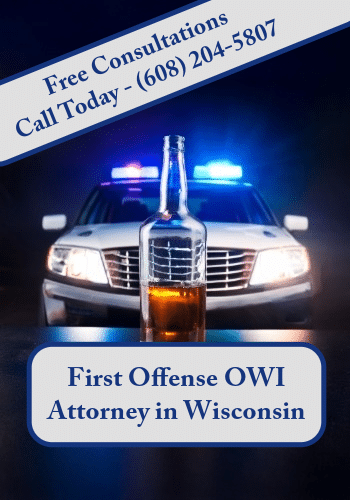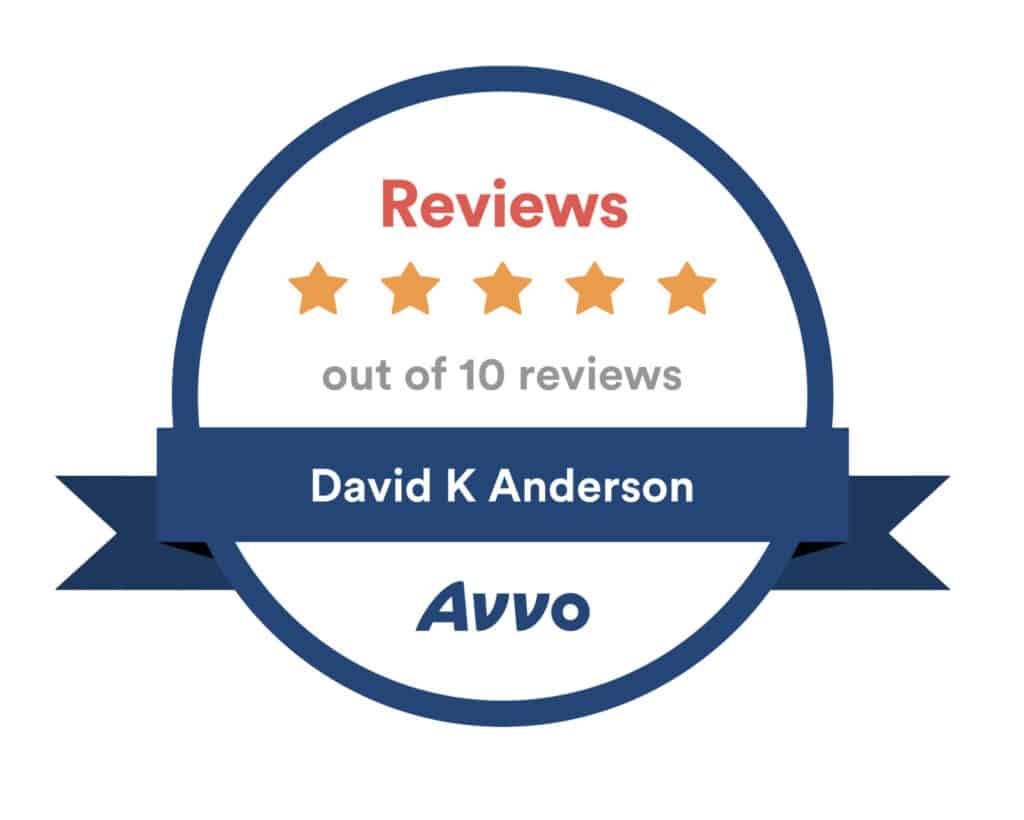First Offense OWI in Wisconsin
- Our Location
Madison, WI
- Free Consultations
(608) 204-5807
Madison, WI First Offense OWI Defense Attorneys
1st OWI in Wisconsin: What You Need to Know
Facing a first offense OWI (Operating While Intoxicated) in Wisconsin can be overwhelming, especially if this is your first interaction with the legal system. While Wisconsin treats a first OWI as a civil traffic citation rather than a criminal offense, it still carries serious consequences, including license revocation, fines, and mandatory assessments.
First Offense OWI Attorney in Wisconsin
At DK Anderson, S.C., we understand the stress and uncertainty that come with an OWI charge. Our goal is to help you navigate the legal process, protect your rights, and minimize the penalties you face.
What Are the Penalties for a First OWI in Wisconsin?
Even though a first OWI is not a criminal charge, it still carries significant penalties:
- Driver’s License Revocation: 6 to 9 months
- Fine:$150 – $300 (plus court costs, which significantly increase the total fine amount)
- Mandatory Alcohol and Other Drug Assessment (AODA)
- Ignition Interlock Device (IID): Required if BAC is 0.15% or higher
- Victim Impact Panel: Required in some jurisdictions
Note: Additional aggravating factors, such as having a minor passenger in the vehicle, can result in enhanced penalties, including possible jail time.
Is a First Offense OWI a Crime in Wisconsin?
No. Wisconsin is the only state where a first OWI is not classified as a criminal offense. Instead, it is treated as a civil traffic violation.
However, it’s important to understand that:
- A second OWI within 10 years is classified as a misdemeanor, carrying mandatory jail time.
- A fourth OWI offense is a felony, no matter how much time has passed since previous offenses.
- High BAC levels (0.15% or more) increase penalties, including the required installation of an Ignition Interlock Device (IID).
Given Wisconsin’s harsh penalties for repeat offenses, fighting a first OWI is critical to avoid long-term consequences.
What Should You Do After Being Arrested for a First OWI?
1. Request a DMV Administrative Hearing (Within 10 Days)
- After an OWI arrest, you have only 10 days to request an administrative hearing to challenge your license suspension.
- If you miss this deadline, your license will be automatically suspended for 6 months.
- This hearing can also provide valuable insight into the prosecution’s case.
Learn More about Administrative review hearings
2. Contact an Experienced 1st OWI Attorney
- An OWI defense attorney can review your case, identify weaknesses in the prosecution’s evidence, and guide you through the legal process.
- The sooner you consult with an attorney, the better your chances of building a strong defense.
3. Document Everything You Remember About the Arrest
- Write down details such as why you were pulled over, what the officer said, and how field sobriety or breath tests were conducted.
- Errors or inconsistencies in police procedures could be key to your defense.
What happens if I Refused a Breath or Blood Test on a First Offense OWI?
Wisconsin has implied consent laws, meaning:
- If you refuse a breathalyzer or blood test after being arrested, and the court determines that your refusal was unreasonable, your driver’s license will be revoked for a period of 1 year for the first offense, and the duration of the revocation will increase for subsequent offenses.
- Police can obtain a warrant for a forced blood draw, even for first offense OWI cases.
- This law changed in 2016, making it easier for law enforcement to collect evidence against drivers suspected of OWI.
- It is imperative that you request a hearing on the refusal with in ten (10) business days or you will lose the right to challenge the allegation of refusing to provide a sample of your breath or blood.
An experienced OWI lawyer can challenge the legality of the stop, the testing procedures, and whether your rights were violated. Often if a refusal and OWI cannot be beat, successful negotiations can lead to getting the refusal dropped.
Getting an Occupational License After a First Offense OWI in Wisconsin
Following a first offense OWI conviction in Wisconsin, your driver’s license will be revoked for a period of 6 to 9 months. However, you may be eligible to apply for an occupational license immediately after the revocation begins, provided you did not refuse a breath or blood test. An occupational license allows limited driving for essential purposes such as work, school, medical appointments, and household errands, but it restricts your driving to no more than 12 hours per day and 60 hours per week. To apply, you must pay a $50 fee, file proof of insurance (SR-22), and complete an Alcohol and Other Drug Assessment (AODA). If your BAC was 0.15 or higher, installation of an Ignition Interlock Device (IID) is also required before the occupational license can be issued. Navigating this process correctly is important—any mistakes can delay reinstatement or lead to further penalties.
How Can an OWI Attorney Help?
Even though a first OWI is not criminal, hiring an attorney can significantly impact the outcome of your case.
We focus on:
✔ Challenging the Traffic Stop – If the officer lacked probable cause to pull you over, the case could be dismissed.
✔ Questioning Breath & Blood Test Accuracy – Breathalyzers must be properly calibrated and administered correctly. Any errors can invalidate the results.
✔ Negotiating for Reduced Penalties – In some cases, we can reduce or eliminate an IID requirement by negotiating a lower BAC level.
✔ Minimizing Long-Term Consequences – A first OWI conviction can increase insurance rates and affect employment opportunities. A strong defense helps mitigate these impacts.
Why Choose DK Anderson, S.C.?
✔ 10+ Years of Experience Defending OWI Cases
✔ Aggressive & Strategic Defense Strategies
✔ Extensive Knowledge of Wisconsin OWI Laws & Court Procedures
✔ Proven Track Record of Reduced Charges & Dismissals
Additional Resources
Take Action Now – Free Consultation
first offense OWI can have lasting consequences, but the right defense can make a difference. Don’t wait—act now to protect your future.
📞 Call (608) 204-5807 to discuss your case today.
Frequently Asked Questions - First Offense Operating While Intoxicted
No. Wisconsin law does not allow OWI offenses to be expunged from your record. Once convicted, an OWI remains on your driving record permanently. This is why fighting the charge is critical.
Yes. A first offense OWI can dramatically increase your insurance premiums, often doubling or tripling rates. Some insurance companies may even drop coverage for drivers with an OWI conviction.
Yes, you may be eligible for an occupational license, which allows limited driving privileges for work, school, or necessary travel. However, you must wait 30 days after license revocation before applying.
For a first offense OWI an IID is only required if your BAC was 0.15% or higher at the time of arrest. If your BAC was below 0.15%, an IID is not mandatory. However, refusing a breath or blood test can also result in an IID requirement.
Yes. Certain professions (e.g., commercial drivers, healthcare workers, government employees) may have strict policies regarding OWI convictions. A conviction can also impact job applications, background checks, and professional licensing.
Our Practice Areas
Drunk Driving
Whether you are charged with a first offense, or a fifth offense, our Wisconsin OWI attorneys can help.
Violent Crimes
A conviction for any one of Wisconsin's violent crimes will have significant consequences.
Drug Charges
Our Wisconsin Drug charge attorneys know the law and how to apply that law in the court room.
Domestic Violence
A conviction for a domestic violence charge in Wisconsin has additional consequences.
Property Crimes
Wisconsin property crimes include theft, forgery, and criminal damage to property.
Sex Offenses
Not much will change your life like a conviction for one of Wisconsin's sex offense charges.
Traffic Citations
Although less serious than a criminal charge, a traffic citation can effect your driver's license.






